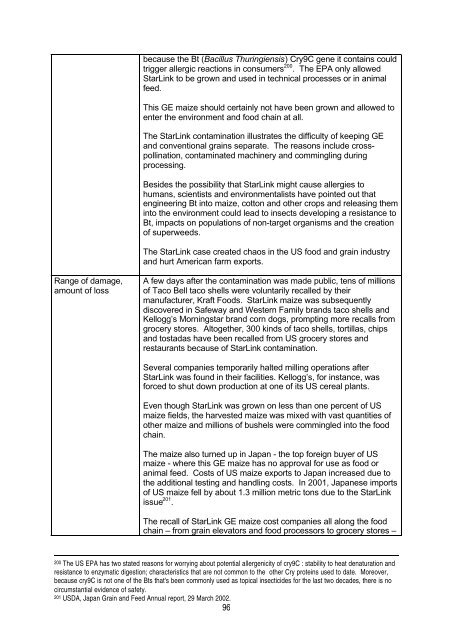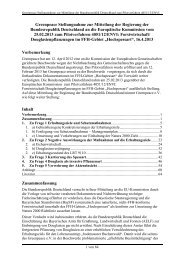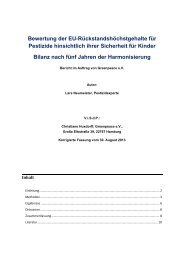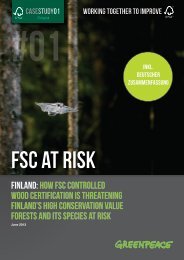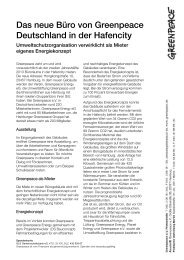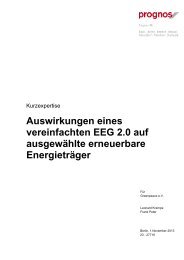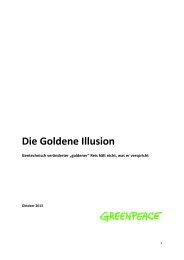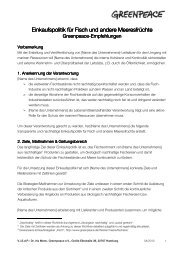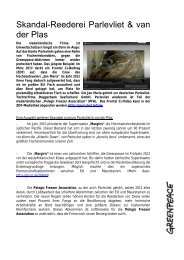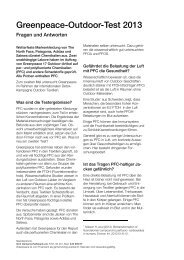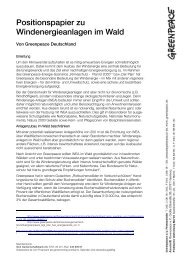Umweltverbrechen multinationaler Konzerne - Greenpeace
Umweltverbrechen multinationaler Konzerne - Greenpeace
Umweltverbrechen multinationaler Konzerne - Greenpeace
Erfolgreiche ePaper selbst erstellen
Machen Sie aus Ihren PDF Publikationen ein blätterbares Flipbook mit unserer einzigartigen Google optimierten e-Paper Software.
Range of damage,<br />
amount of loss<br />
because the Bt (Bacillus Thuringiensis) Cry9C gene it contains could<br />
trigger allergic reactions in consumers 200 . The EPA only allowed<br />
StarLink to be grown and used in technical processes or in animal<br />
feed.<br />
This GE maize should certainly not have been grown and allowed to<br />
enter the environment and food chain at all.<br />
The StarLink contamination illustrates the difficulty of keeping GE<br />
and conventional grains separate. The reasons include crosspollination,<br />
contaminated machinery and commingling during<br />
processing.<br />
Besides the possibility that StarLink might cause allergies to<br />
humans, scientists and environmentalists have pointed out that<br />
engineering Bt into maize, cotton and other crops and releasing them<br />
into the environment could lead to insects developing a resistance to<br />
Bt, impacts on populations of non-target organisms and the creation<br />
of superweeds.<br />
The StarLink case created chaos in the US food and grain industry<br />
and hurt American farm exports.<br />
A few days after the contamination was made public, tens of millions<br />
of Taco Bell taco shells were voluntarily recalled by their<br />
manufacturer, Kraft Foods. StarLink maize was subsequently<br />
discovered in Safeway and Western Family brands taco shells and<br />
Kellogg’s Morningstar brand corn dogs, prompting more recalls from<br />
grocery stores. Altogether, 300 kinds of taco shells, tortillas, chips<br />
and tostadas have been recalled from US grocery stores and<br />
restaurants because of StarLink contamination.<br />
Several companies temporarily halted milling operations after<br />
StarLink was found in their facilities. Kellogg’s, for instance, was<br />
forced to shut down production at one of its US cereal plants.<br />
Even though StarLink was grown on less than one percent of US<br />
maize fields, the harvested maize was mixed with vast quantities of<br />
other maize and millions of bushels were commingled into the food<br />
chain.<br />
The maize also turned up in Japan - the top foreign buyer of US<br />
maize - where this GE maize has no approval for use as food or<br />
animal feed. Costs of US maize exports to Japan increased due to<br />
the additional testing and handling costs. In 2001, Japanese imports<br />
of US maize fell by about 1.3 million metric tons due to the StarLink<br />
issue 201 .<br />
The recall of StarLink GE maize cost companies all along the food<br />
chain – from grain elevators and food processors to grocery stores –<br />
200 The US EPA has two stated reasons for worrying about potential allergenicity of cry9C : stability to heat denaturation and<br />
resistance to enzymatic digestion; characteristics that are not common to the other Cry proteins used to date. Moreover,<br />
because cry9C is not one of the Bts that's been commonly used as topical insecticides for the last two decades, there is no<br />
circumstantial evidence of safety.<br />
201 USDA, Japan Grain and Feed Annual report, 29 March 2002.<br />
96


